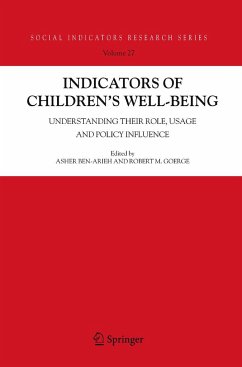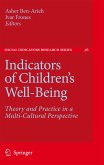ROBERT C. GRANGER William T. Grant Foundation During the past 10 years or so, a number of researchers, policymakers, and prac- tioners have made important progress on the identi?cation and use of indicators of children's well-being. The United States federal government, via the Department of Health and Human Services and the National Institutes of Health, as well as such private funders as the Annie E. Casey Foundation, have supported many of these efforts. During this time, the William T. Grant Foundation, who was not a primary funder of such activities, was nevertheless one of the many institutions bene?ting from the work. Fortunately, Asher Ben-Arieh, Larry Aber, and Bob Goerge persuaded us to support a working conference on how to assess the effects of indicator usage on policiesandprograms.Thisvolumeistheresultoftheirtalentsandtheclearthinking of many of their colleagues. It is my pleasure to introduce the volume with a few thoughts about its contributions and the questions that remain.
From the reviews of the first edition:
"This book offers important insights and sources of useful data for psychologists interested in contributing to the improvement of the life conditions of children. Most important, the text offers psychologists an opportunity to reflect on how they might contribute to the work that is needed for Americans to achieve the good and healthy society that Maslow (1943) envisioned as enabling its citizens to achieve their highest purposes." (Patricia T. Ashton, PsycCRITIQUES, January, 2007)
"This book offers important insights and sources of useful data for psychologists interested in contributing to the improvement of the life conditions of children. Most important, the text offers psychologists an opportunity to reflect on how they might contribute to the work that is needed for Americans to achieve the good and healthy society that Maslow (1943) envisioned as enabling its citizens to achieve their highest purposes." (Patricia T. Ashton, PsycCRITIQUES, January, 2007)








